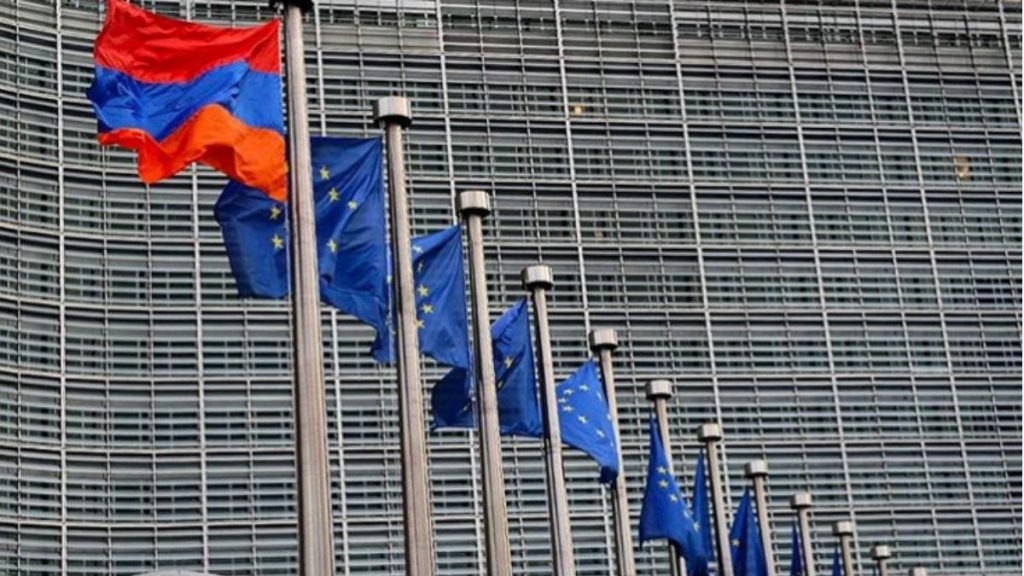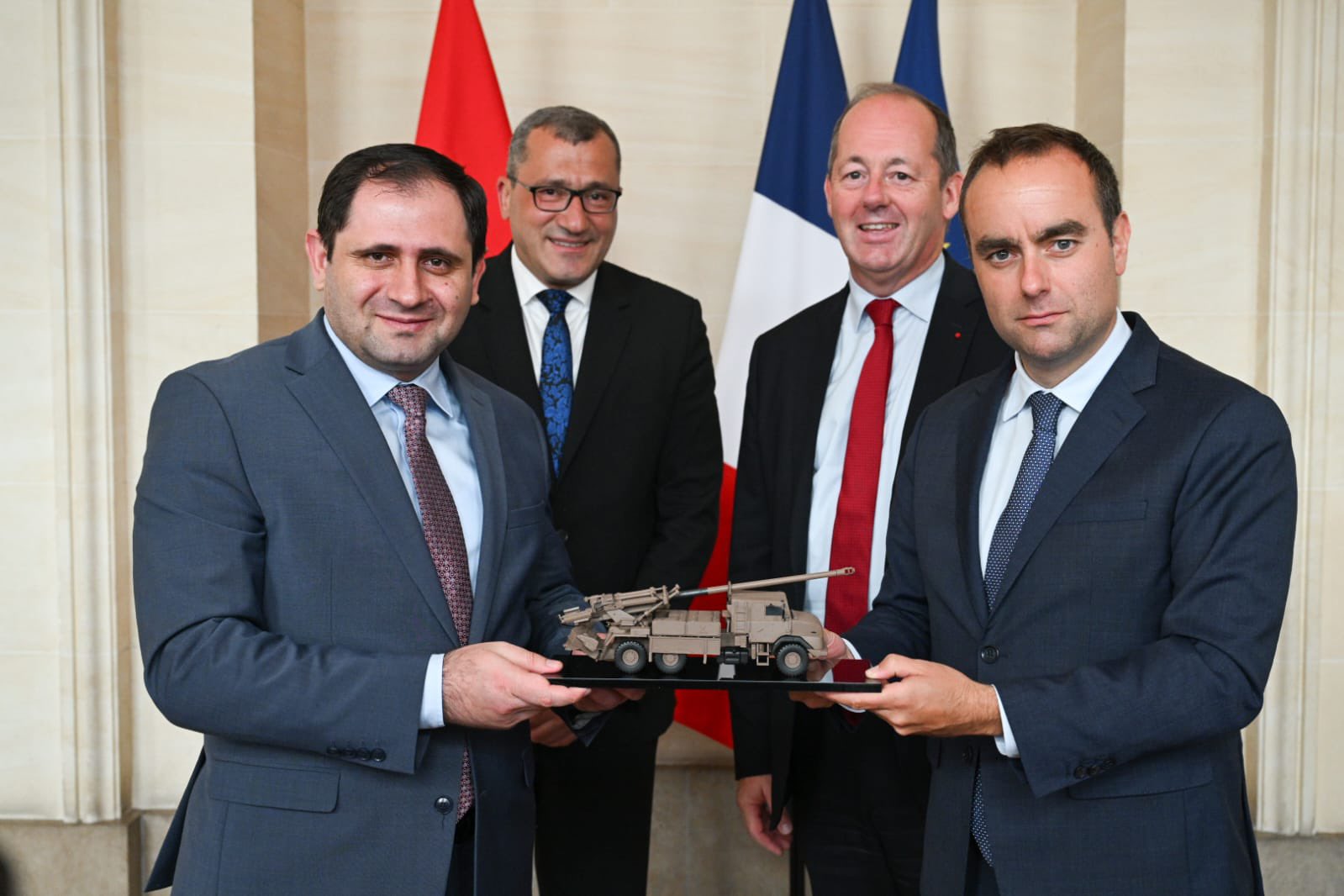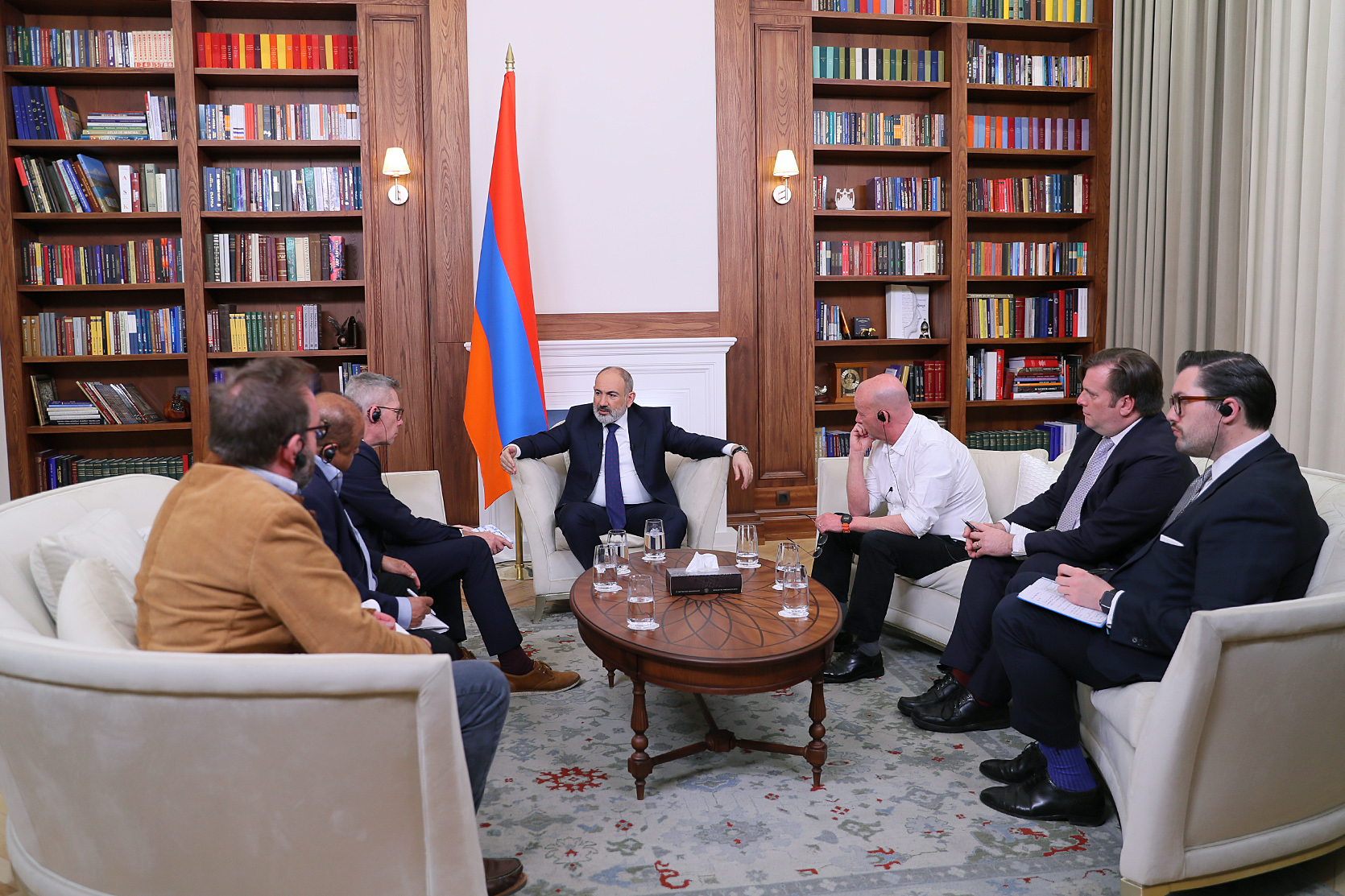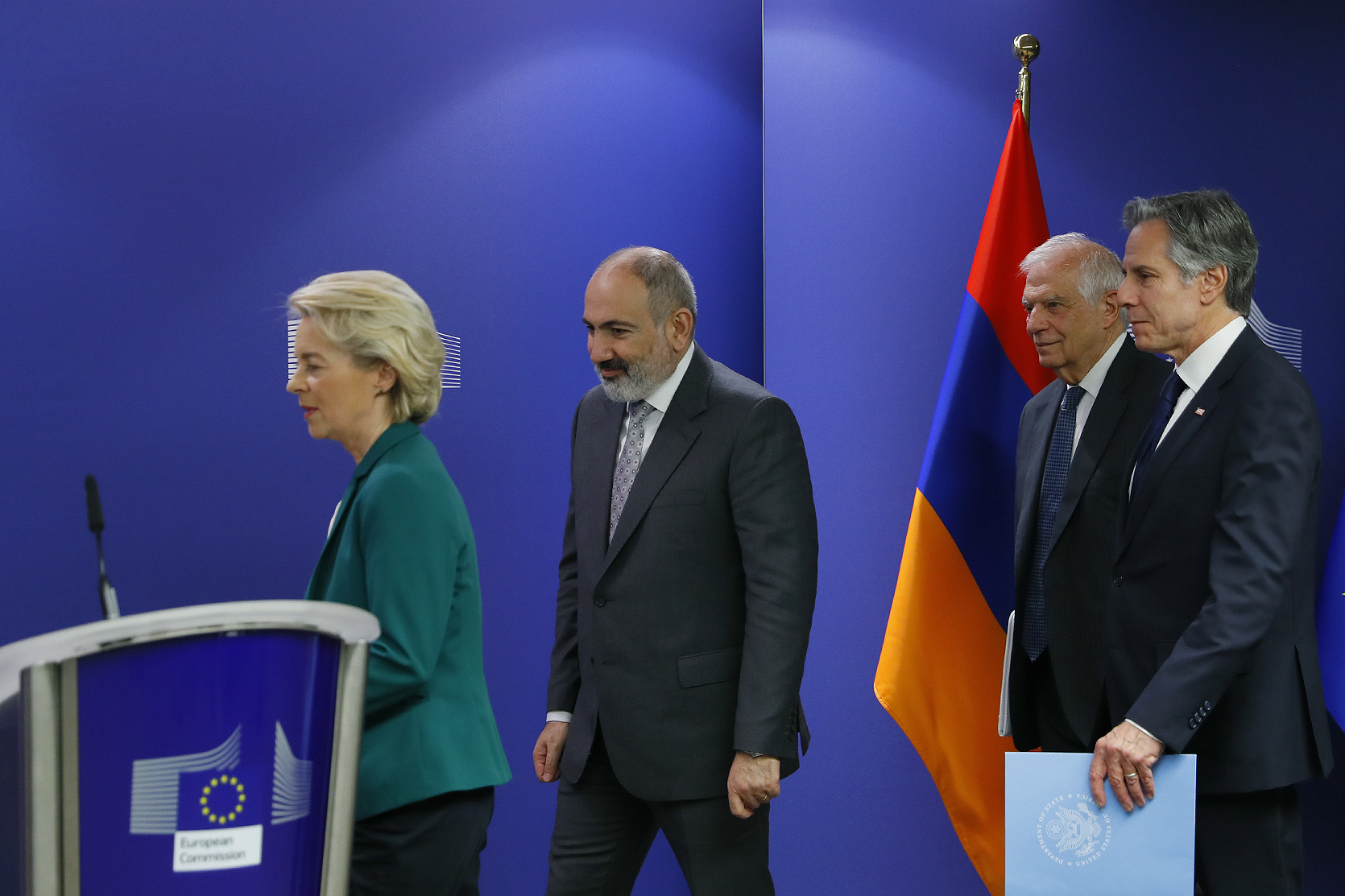Armenia discusses plans for holding a referendum on EU accession
Referendum on Armenia’s EU accession
Four parties not represented in Armenia‘s parliament are urging authorities to hold a referendum in the coming months on joining the European Union. Their leaders believe that only the EU can help solve Armenia’s key issues, including ensuring the country’s security and preserving its sovereignty.
Parliamentary hearings on this matter began this morning at the National Assembly, attended by lawmakers, the parliamentary committee on European integration, representatives of non-parliamentary political forces and civil society, as well as political analysts.
“Armenia, which has applied for EU membership, would be safer, especially in terms of external political pressure from Russia, Turkey, and Azerbaijan, compared to today,” said Aram Sargsyan, leader of the Republic Party.
Political analyst Areg Kochinyan considers a referendum necessary. According to him, its results would give Armenian authorities a mandate for a new foreign policy course. However, he views it as a strategic mistake to pit European integration against the process of normalizing relations with Turkey and Azerbaijan.
“I rule out Armenia’s EU membership without resolving Armenian-Azerbaijani and Armenian-Turkish relations,” Kochinyan stated during parliamentary hearings.
- “Armenia provided with safety cushions” – Opinion on the Brussels meeting
- Armenia’s economic ties with the West: Tough, yet achievable
- “The EU is an ally of Armenia’s peaceful agenda,” – Armenian political analyst
The position of the proposal authors
The idea to hold a referendum on Armenia’s accession to the EU originates from the “United platform of democratic forces,” formed by four parties: “European Party of Armenia,” “Republic,” “For the Republic,” and “Christian Democratic Party.”
Yesterday, they organized a conference on the same topic, attended by politicians, political analysts, representatives of civil society, and Armenians interested in the discussion. Following the conference, the platform issued a call to the authorities to organize a referendum on EU membership within the next four months.
In their appeal to the authorities, non-parliamentary forces emphasize “the imperative of ensuring the security of the people, economic and human development, and cultural progress of Armenia, which at this historical stage can only be achieved through European integration.”
“EU membership benefits small states”
At the outset of the hearings, Arman Yeghoyan, Chairman of the Parliamentary Committee on European Integration, stated that there is no question for the authorities whether it is beneficial to be an EU member.
“The answer to this question is simple: EU membership is beneficial to small states because they contribute relatively little to the structure and receive relatively much. Experience has shown that small countries experience rapid and substantial growth after joining the EU,” said Yeghoyan.
He emphasized that the goal of the hearings is to discuss Armenia’s path to Euro-integration, addressing questions of how, through which instruments, and within what timeframe. Yeghoyan reminded that EU accession is a lengthy process, not a single step. Therefore, he stated that the National Assembly expects substantive proposals from non-parliamentary forces, rather than propagandistic speeches.
“Choice between statehood or non-existence”
“Today, we are forced to choose not between Europe and something else, but between the prospect of our state’s existence or non-existence,” said Stepan Safaryan, Director of the Armenian Institute of International Relations and Security Issues.
According to him, Armenia came to this realization under the pressure of concrete facts — “during the 2020 Karabakh war, the invasion of Azerbaijani armed forces into sovereign Armenian territory, showing that regional security systems are not functioning, and the Russian military bloc CSTO is not an indifferent but a hostile structure.” He believes that Armenia must soon renounce allies openly acting against it and leave hostile integration structures:
“For Armenia, joining the EU is primarily about acquiring allies to overcome regional security challenges. Yerevan has the opportunity to gain over 20 allies through Euro-integration. Besides security, this will also bring prosperity and progress.”
Chairman of the “Republic” party, Aram Sargsyan, proposes that the government organize a referendum on September 21. On this day in 1991, Armenia held a referendum on independence.
“The issue is not just about symbolism, although symbolism is also very important. It will signify that once again we are striving to be an island of democracy in this region,” he said.
Additionally, according to Aram Sargsyan, the referendum will provide an additional security cushion for Armenia:
“In the EU, Armenia’s perception and assistance will change. I have no doubt that the Armenian people will receive very generous compensation in terms of arms, security, as well as economic development and investments.”
Public opinion will say “yes” in the referendum, believes Hovsep Khurshudyan, head of the NGO “Free Citizen”:
“EU integration is, above all, a responsibility. The citizens of the Republic of Armenia must take this responsibility upon themselves. After all, this will be a challenging path.”
Flag of the EU on the Parliament tribune
Leader of the ‘For the Republic’ party, Arman Babajanyan stated:
‘The results of the referendum should be included in the new constitution. We should not follow the example of Georgia, which simply included a clause on European integration in the constitution. We need to include a clause on the results of the referendum. Conducting this referendum will help deepen relations not only with the EU, but also with the USA.’
As Arman Babajanyan concluded his speech, a boot appeared in his hand.
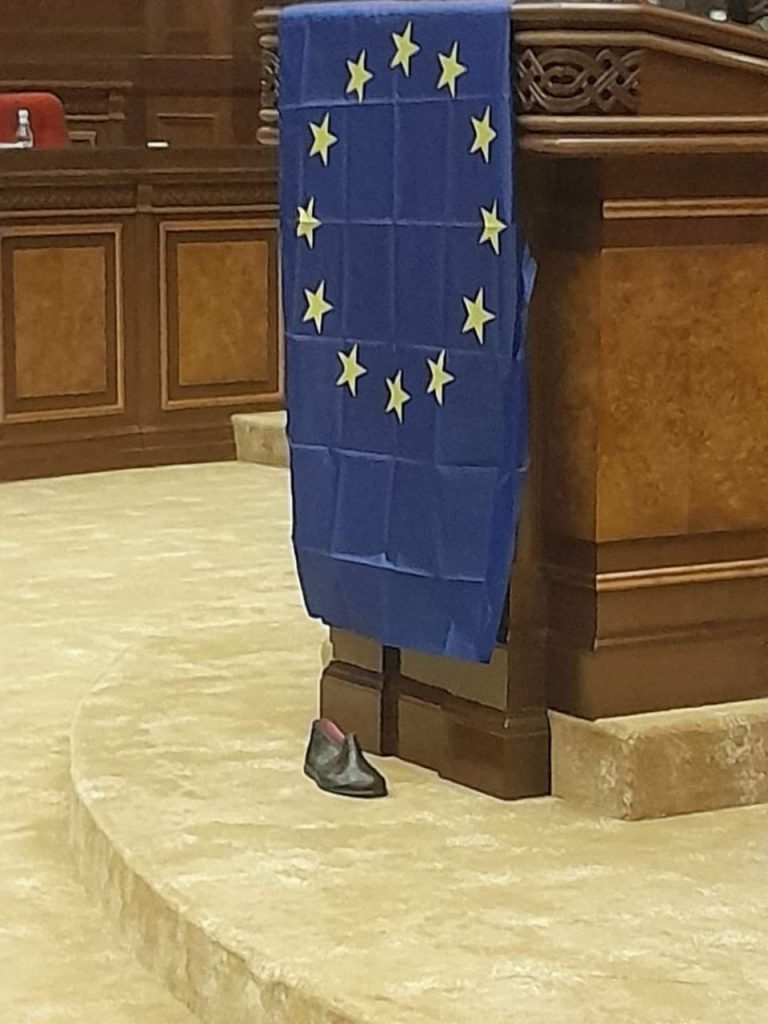
‘For clarity. Can you see this old boot? It symbolizes the regression that has been occurring on our streets in recent days, including the foreign policy disgrace, which aims to lead us to destruction, catastrophe [referring to the street struggle of the protest movement ‘Tavush for the Sake of the Homerland’, supported by two former pro-Russian presidents of Armenia – Robert Kocharyan and Serzh Sargsyan]. We need liberation from this toxic environment. And there can be no second opinion about it. This [showing the boot] should simply be removed from our reality. And I would like our discussion to take place with this flag on the tribune,’ he said, displaying the EU flag on the tribune.
Chairing the hearings, Arman Yeghoyan called these actions a political stunt:
‘They do not add additional content to the discussion. Are we conducting substantive discussions to find a solution, or are we giving the hearings a symbolic character? The discussion is taking place in the Parliament of Armenia, and only the flag of Armenia should be displayed here.’
The flag topic was continued by the leader of the ‘European Party of Armenia’, Tigran Khzmalyan.
‘Our flag is incomplete without the flag of the European Union. Armenia is Europe,’ he stated.
Political analyst Areg Kochinyan’s opinion
“It should be understood that as a result of the known events that took place in 2021-23—attacks by Azerbaijanis on Armenia’s sovereign territories, ethnic cleansing in Nagorno-Karabakh—Armenia has undergone serious, reactive changes in its foreign policy course.
What do I mean by reactivity? We started buying weapons from other countries because our ‘strategic ally’ [Russia] was not selling us weapons. We developed cooperation with other countries because the existing one did not justify itself. And now it is relevant to obtain a mandate for a new course in Armenia’s foreign policy.
To continue the discussion on Euro-integration, we need support in the form of a referendum and a mandate obtained from it. In addition, there is a need to transition from reactive to proactive policies.
If until now we have responded to foreign policy challenges only through diversification, then this referendum could be a turning point after which we can shift to proactive policies. We will then propose our agenda in our bilateral and multilateral relations.
It is also important to understand that Armenia cannot become a member of the EU until Armenian-Turkish and Armenian-Azerbaijani relations are resolved. We often discuss: if we sign a peace treaty with Azerbaijan now, open the border with Turkey, what guarantee is there that they will not ignore all this tomorrow, not come up with new demands, or not strike again? Euro-integration of Armenia can become this guarantee. Armenia’s EU membership is a guarantee of peace.”










